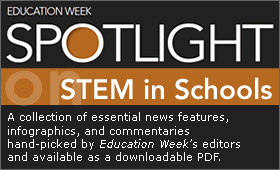Most schools have their share of math and science students who ace standardized tests, thrive during classroom discussions, and excel on independent research projects—who, in short, conquer every academic task thrown their way.
But how can schools produce more mathematics and science students with a distinct and harder-to-define skill: the ability to innovate and become future innovators in American business, science, medicine, and other areas?
That question is at the heart of work being conducted by a committee of the National Science Board, which is holding a series of discussions on the topic here this week. The goal of the board, which sets policy for the National Science Foundation, is to produce a series of policy recommendations by next year on how schools can produce more elite innovators in science, technology, engineering, and mathematics—known as the “STEM” fields for short.
Members of the expert committee said their final report will likely have to address several questions. What are the characteristics of an innovator—ability, interest, determination, curiosity, or all of those traits? What separates innovative ability from other, related skills, such as creativity? And can math and science classroom instruction and assessment in the United States realistically be revamped to nurture innovation among students?
Preparing for Economy
Educators and policymakers have become increasingly keen in recent years on providing new and different academic challenges for elite students. Some say U.S. schools tend to focus on raising the performance of low- and middle-performing students, at the expense of top-performers. Others argue the changes in the global economy make the ability to foster entrepreneurship and innovation more essential to the United States’ prosperity than ever before.
“Our economy has changed,” said Camilla P. Benbow, a science-board member who helped guide the committee’s discussion yesterday. “It’s a highly technological, knowledge-based economy,” she said, which increasingly values “an educated workforce and the individuals who can create innovations.”
“Innovators are a bit of a different breed,” Ms. Benbow added. A central charge for the committee, she said, is to examine, “What are their needs? What should our education system be doing to meet those needs?”
The committee will likely submit a white paper to the full National Science Board by spring, said Ms. Benbow, the dean of the Peabody College of Education and Human Development at Vanderbilt University, in Nashville, Tenn. Its recommendations will be directed to the NSF, she said, and potentially also to the entire federal government.
Several speakers at the science board’s forum suggested that K-12 math and science lessons in U.S. classrooms do not place enough emphasis on the skills that generate innovative ability.
David Lubinski, a psychology professor at Vanderbilt’s Peabody College, told the committee that lessons tend to emphasize verbal and quantitative ability, rather than spatial skill that can prove crucial to innovation in engineering and the physical sciences. Schools could build spatial skills by promoting student activities and projects in areas such as robotics and through lab lessons in the physical sciences, Mr. Lubinski argued.
Compared with other countries, a fairly strong percentage of U.S. economic growth is based in industries rooted in creative and innovative industries, said R. Keith Sawyer, an associate professor of education at Washington University in St. Louis, who also addressed the committee. “We’re absolutely doing something right” in promoting innovation, he said.
Yet using the U.S. education system to build those skills will not be easy, Mr. Sawyer said, because so little is known about how to measure that talent among students.
“We don’t have good research on how to test creativity and deeper conceptual knowledge,” he said.
American science teachers could do more to spark innovation and general interest in the subject by fostering in-class discussions about scientific questions that have not yet been answered, said Robert Root-Bernstein, a professor of physiology at Michigan State University, in East Lansing. An effective teacher can use scientific unknowns to generate excitement and curiosity among students and help students ask scientific questions, he said.

“You shouldn’t be a teacher if you can’t say, ‘I don’t know,’ ” Mr. Root-Bernstein said, adding that teachers need to follow up by saying, “Let’s find out.”
Students also would be more inspired to think as innovators if they saw more descriptions of “real stories about real innovators” in science textbooks, added Mr. Root-Bernstein. Over the past century, he said, a common characteristic of many of the world’s top innovators has been that they received a broad-based education.
“They learned to become learners, first of all,” he said, “and learned how to do it in an extremely disciplined way.”
Many of those scientists also took a strong interest in arts, music, and other pursuits far removed from math and science, said Mr. Root-Bernstein, who has studied the academic training of many of those individuals.
Student Passion
In addition to hearing from scholars, the committee sought advice from others with relevant expertise: top-performing high school and college students. Five students were asked to speak about the factors that inspired their passion for math and science.
Some said they were hooked by having taken part in academic competitions, which challenged them in different ways from their traditional classes. One student said the spark came in a subtle way—from reading the science magazines her parents subscribed to at home. And several spoke favorably of math and science magnet programs, which put them in the company of peers with similar talents and interests.
One of the panelists, Louis Wasserman, 18, argued that schools overlook the power they have to inspire students by daring them to become in-class inventors. Mr. Wasserman, who now attends the University of Chicago, recalled the thrill he felt as a student while devising innovations that he was certain were original. “I was frequently misguided,” he said, to laughter from the audience.
No matter.
“Students get excited about creating new things—it doesn’t matter if it’s actually new,” Mr. Wasserman said. The “joy of creating something,” he said, is “extraordinary.”





